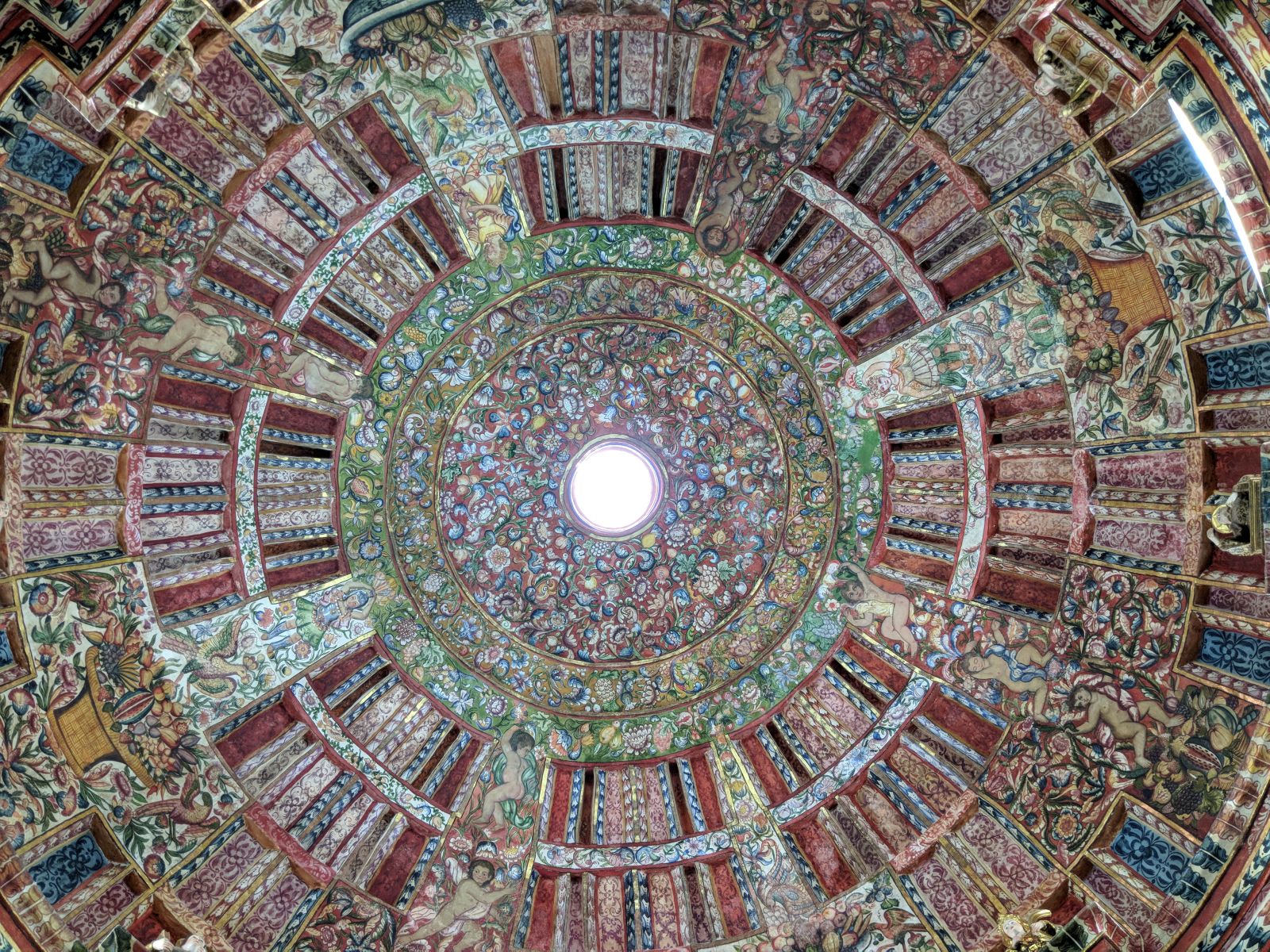Projektpräsentation
Max-Planck Partner Group “Empires, Environments, Objects”
Fernando Loffredo and Cécile Michaud

Dome of the Chapel of Saint Ignatius of Loyola, Jesuit Church of La Compañía, Arequipa, Peru
The aim of this project is to explore the web of connections and conflicts among the visual and material cultures and its transformative power in diverse communities of people across the global territories under Spanish and Portuguese rule, with a particular focus on early modern Latin America and the Pacific Rim. The main actors of this research will be the Empire, in its political declinations and infrastructures; the Environment, in its diverse stable or mobile forms; and the Object, be it artistic, artisanal, or natural. As a group, thus, we not only seek to tell stories and travels of specific objects but also to reveal the entangled reasons that generated their dislocations, as well as how objects were transported; the ways in which they were transformed, manipulated, and packed throughout their displacements; the different meanings that they acquired; their impact on local visual and material cultures; and, finally, how objects might have transformed - or been transformed by - the environments in which they lived their peripatetic lives.
Fernando Loffredo is Assistant Professor of Early Modern Mediterranean and Colonial Visual Culture in the Department of Hispanic Languages and Literature at the State University of New York at Stony Brook and Visiting Professor at the Pontificia Universidad Católica del Perú, Lima. His primary research interests are trans-Mediterranean artistic relations, sculpture and the urban space, and the dialogues between art and poetry in the early modern world, with a particular focus on the territories under Spanish rule across the globe. He was the Andrew W. Mellon Post-Doctoral Fellow 2015-2017 at CASVA (National Gallery of Art, Washington DC), and Harvard’s I Tatti/Museo Nacional del Prado Inaugural Fellow 2020-2021. Within the network of the Max-Planck Institutes, Professor Loffredo was the recipient of postdoctoral fellowships granted by the Kunsthistorisches Institut in Florenz and the Bibliotheca Hertziana.
Cécile Michaud is Associate Professor and Director of the MA in History of Art and Curatorial Studies at the Pontificia Universidad Católica del Perú, Lima. Her research interests focus on the material and visual culture of the Viceroyalty of Peru between the 16th and 18th century, the correlation between text and image, and the relationship between religious literature (such as sermons, sacred poetry, and hagiography) and the work of art. She earned a PhD from the Université de Strasbourg (2003) with a dissertation subsequently published under the title Johann Heinrich Schönfeld. Un peintre allemand du XVII siècle en Italie (Munich: Martin Meidenbauer Verlag, 2006). She is co-author or co-editor of the following books; De Amberes al Cusco: El grabado europeo como fuente del arte virreinal. Colección Barbosa Stern (Lima: Impulso Editorial, 2009); Escritura e imagen en Hispanoamérica. De la crónica ilustrada al cómic (Lima: Fondo Editorial PUCP, 2015); Arte antes de la historia. Para una historia del arte andino antiguo (Lima, Fondo Editorial PUCP, 2020). Professor Michaud was the recipient of a DAAD doctoral fellowship (1999-2000, Ruprecht-Karls-Universität) and KAAD Postdoctoral Fellowship (Kunsthistorisches Institut, Ruprecht-Karls-Universität, 2017).
12. Januar 2023, 11:00 Uhr
Venue
Palazzo Grifoni Budini Gattai
Via dei Servi 51
50122 Firenze, Italia
Hinweis
Diese Veranstaltung wird durch Fotografien und/oder Videoaufnahmen dokumentiert. Falls es nicht Ihre Zustimmung findet, dass das Kunsthistorische Institut in Florenz Aufnahmen, auf denen Sie erkennbar abgebildet sein könnten, für die Veranstaltungsdokumentation und Öffentlichkeitsarbeit (z.B. Social Media) verwendet, bitten wir um eine entsprechende Rückmeldung.



